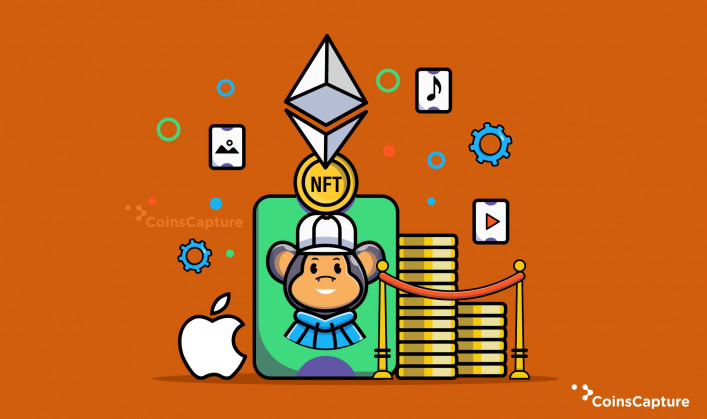7 November 2025
Apple Follows EU Laws & NFT App Developers Win Big
Apple is getting ready to enable 3rd party app stores on its devices in response to new anti-monopolistic legislation from the European Union (EU). At least in Europe, this might be seen as a major win for the creators of Crypto and NFT apps. According to a Bloomberg article published on December 13 that cites people with knowledge of the situation, the new regulations will allow European customers to access app marketplaces other than Apple's exclusive App Store, allowing them to access apps without paying Apple's 30% charge or being subject to Apple's application restrictions. Applications which deal with NFTs must adhere to Apple's new rules, which prohibit them from allowing users to buy with Cryptocurrencies and charge a 30% fee on in-app transactions made by users.
Also Read: Top 6 Potential Altcoins To Purchase In 2022
What is an NFT?
Non-fungible tokens, or NFTs, are digital assets that cannot be exchanged for other tokens of equal value. Those virtual currencies are blockchain-based, which means they are decentralized digital records. They can't be swapped for other virtual currencies in the same way. Such as Bitcoin or Ethereum. Due to its singular characteristics, it is appropriately denoted by the acronym NFT, which stands for "not a functional equivalent." The ability to buy, sell, as well as trade fiat and digital currencies is due to their fungibility.
Also Read: A Disaster Of NFTs In Music Industry And Taxation
Why are NFTs and Cryptocurrencies Benefiting?
Due to Apple's efforts to restrict or prohibit Crypto-related transactions, the Act comes as welcome news for Web3. One is that Apple started collecting a 30% charge on NFT trades in their app starting in September 2022. Consequently, app developers, many of whom operate on a shoestring budget, would've been forced to absorb a 30% charge. Even more outrageously, a couple of months later Apple's latest anti-NFT regulation indicated they barred NFT restricted material on the system. To add insult to injury, applications were not allowed to accept Cryptocurrencies as payment. The future of NFTs in the Apple App Store seemed bleak at the time. But things have just taken a dramatic turn for the better, with Apple's emergence as a major trading as well as development ecosystem.
As a global leader in mobile computing, Apple is well renowned for its innovative iOS as well as lucrative App Store. With in-app memberships, sales, and premium applications, this app sector made almost $85 billion in 2021 alone. The latest verdict will give NFT firms a boost, giving them a chance to compete in the fiercely competitive digital marketplace, but it's basically a megastore that has previously hampered the NFT sector. Since it is an EU requirement, it only applies to citizens of the EU. Ultimately, this is a positive step forward for the Cryptocurrency as well as NFT industries and may pave the way for similar regulations that facilitate the secure and easy exchange of virtual currencies.
Coinbase's upgrade to itself-custody wallet app was halted on December 1 when Apple enforced its restriction, ostensibly because the company intended to "collect 30% of the gas price" through in-app purchases, which is "clearly not viable," as stated by Coinbase. The third allegation has been that Apple intended the wallet to disable NFT transactions if they couldn't be processed through Apple's in-app purchase method. On December 13, Alex Salnikov, co-founder of NFT marketplace Rarible, tweeted his thoughts on a story that said a "Crypto app store" may be developed and would be a "great candidate" for a private equity startup.
Apple has opted to open its ecosystem in response to the EU's Digital Markets Act, which aims to regulate "gatekeepers" and ensure that platforms act fairly. The ability for "third parties to inter-operate with the gatekeeper's services" is one of the safeguards in place. The mandate goes into effect in May 2023, and businesses have until May 2024 to reach full compliance. Apple has not decided whether or not it will indeed comply with the Act's clause that allows programmers to include other payment options inside non-Apple-related apps.
If it follows the rules, virtual monies might be integrated into existing payment networks. The technology giant is contemplating implementing security rules for software not available in its store, like Apple certification, to protect consumers from malicious programs. The changes to Apple's closed environment would only apply to the European Union; other countries would need to implement laws with identical measures, like the Open App Markets Act proposed by Senators Marsha Blackburn as well as Richard Blumenthal in the United States.
Disclaimer: The author’s thoughts and comments are solely for educational reasons and informative purposes only. They do not represent financial, investment, or other advice.






